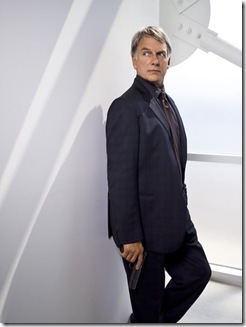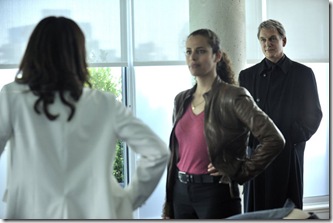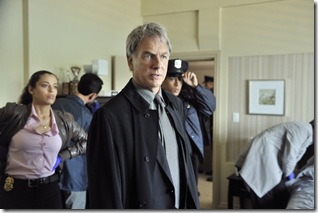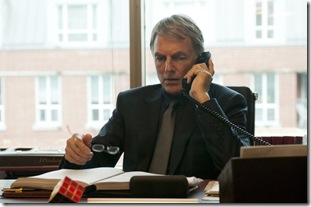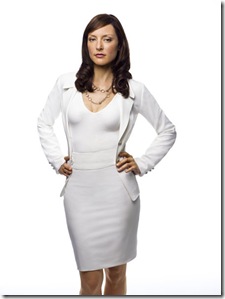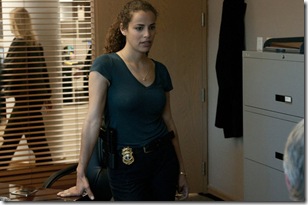USA Network’s John Sanford’s Certain Prey [encoring Saturday, Nov. 12, 11/10C] marked the debut of Mark Harmon as Sanford’s Deputy Police Chief Lucas Davenport – a role that could become a regular thing for both the network and Harmon.
Already much beloved for roles ranging from the blunt surgeon Dr. Jack McNeil and, especially, NCIS’ Special Agent Leroy Jethro Gibbs, Harmon is hoping that Certain Prey will kick off a series of Lucas Davenport mysteries – Sanford has written twenty-two novels in the series, so there’s a wealth of material available for adaptation.
Harmon was charmingly gregarious in this teleconference Q&A and it’s too bad that technical difficulties prevented us from posting this Q&A prior to Certain Prey’s premiere – but, as mentioned above, there will be an encore presentation Saturday.
Hi. It’s such a pleasure to speak with you.
Mark Harmon: Hi. Thanks for the question.
I’d like to know if you notice any similarities between Lucas and your role as Gibbs and if there’s any more plans for Prey roles.
Harmon: Well, you know, I was a fan of John Sandford’s, you know, going back into the ‘80s. I’ve read his books. And when the opportunity came to meet with people who had the rights to the stories I was excited by it just because I like this author and I admire this character.
I think there are certainly similarities. But they’re very different people to me. Otherwise, you know, I – the attraction as an actor to play something different is always there. But it’s not so far outside the box that it’s hopefully shocking unbelievable. I mean Davenport’s a very different guy than Gibbs certainly.
But I just hope we honored the book and the material and did it right. You know?
And there’s opportunities here obviously because this is the tenth of 22 books so far written about this character and this piece. And USA’s been a great partner. And together we’re kind of putting our foot in the water here to see whether it can work. You know?
I just want to say – start off by saying I’m a huge fan of NCIS and I can’t wait to see Certain Prey.
Harmon: Well I’m glad. I hope others share your opinion.
I actually have two fairly short questions. The first one is: did you have to go through any special preparation to play Lucas on Certain Prey?
Harmon: Well, we had to grow my hair as long as it could be given the schedule on NCIS. So we kind of – we cheated a little bit at the end of last year.
But aside from that, you know, I just – I’m a fan of the book and certainly a fan of the character because of that. But we so tried to be not only respectable but, you know, honest with the material in the book. And we tried to do that right, you know, up front. That was a walking order so to speak. And I hope we did that.
I just think it’s a different role and certainly one I enjoyed playing. Whether we do more of these or not I don’t know yet. But right now I feel good about the experience.
Okay. And my second question is: being on NCIS for so long how do you keep things from becoming routine for you?
Harmon: Well it’s just never happened. I mean we, you know, this role originally attracted me because it was about character and there was humor. And yeah there was a case but the case wasn’t what drove the series. And I think that’s still true.
And you’ve got a gathering of actors on this show who all like each other. And we all are continually challenged.
This show continues to grow. And it continues to do better now than it did even last year. You know? We’re doing better now. And so obviously we’re doing something right.
But it’s our job to try to keep it there, you know, to try to keep raising the bar. And really from the beginning on this show that hasn’t changed. It’s always been about the work.
In the beginning when we weren’t a hit and we were kind of in the midline somewhere there what moved us along the line was just concentrating on the work to try to get a handle on what we were doing, try to figure out a way to do this better every day. And that continues.
There’s nobody bored here. You know? There’s nobody phoning it in. And that’s – that goes in front of the camera and behind the camera. And that makes this rare I think for all of us.
Just wanted to make sure you weren’t bored. But…
Harmon: No.
So what is it about Lucas Davenport that attracted you to this role?
Harmon: Well I just – I mean he’s a – he’s an interesting guy. You know? He’s a very successful businessman who, you know, dresses nice and drives nice cars and chases the ladies and yet what he likes more than any of it is just being a cop.
And then there’s the other side of it which is (unintelligible). I mean he’s as nasty as anybody he’s chasing. You know?
So that’s fun to play. And there’s a darkness to that and to defining that character.
And then certainly Sandford gives so much information about that over the course of these 22 novels that it’s a field day for an actor, so much to lean on and to know about a character you’re trying to portray. I just, you know, more than any of it, want to do it right. You know?
And to do that you jump off and you take an opportunity to develop a project. And you do that based on the book. And I think collectively when we were all sitting in a room a couple years ago talking about which direction to head in this I think straight across the board we targeted Certain Prey as the place to start.
That doesn’t mean there won’t be more on the back side of that. But for right now to jump off in this direction with this character and to try to just be honest with the material was the target of what we were trying to do.
How would you describe Lucas’s relationship with Clara and Carmel?
Harmon: Adversarial. I mean they – part of what drew the appeal too is you’ve got two really terrific female bad guys here. You know? And casting those people and finding the right people to play those people was part of that. You know?
But, you know, in a day and an age when those kind of roles are rare this project had two of them. And one of them will continue. You know? One of them continues into other books.
So I think the setup for this is, you know, the bookend novel to this – Sandford actually wrote four novels distant from where we would go if we had the opportunity to do a second one but this is a continuing story. And many of these characters will continue from book to book.
Since you played many cops over the years in what ways did Lucas Davenport give you something new as a character?
Harmon: Oh I’ve never played a guy like him before. It’s – I mean just physically. He’s, you know, I think Sandford does such a great job of setting that up.
And I have the advantage of knowing his background, having read all the books. But where we pick up this story is ten novels in. You know, from the way he dresses to the cars he drives to the – to what he is, you know, personally, it’s all very different from what he is as a cop.
And then the other personal side of that is almost the personal path he goes on his own, you know, to try to solve these things, to try to push through these cases. He’s a driving force and yet I think all these characters in these books are every bit as important as his character. And we tried to put that together and cast that accordingly, that these will be characters that should we do more than just one will continue on.
But for me, you know, I’m looking to play something certainly somewhat different than what I’m doing on the series but not so much different that it’s, you know, blaringly shocking.
You know, actors are attracted to characters they want to play. And that was true to me with Davenport. Whether I pulled it off or not is going to be up to you when you see it.
And since Certain Prey is later on in the series of books can you talk about the decision to introduce Davenport with this project?
Harmon: Well it just was in a room with, you know, five or six people sitting there talking about the whole series of books and talking about where do you start. Certainly some of the earlier books have Davenport as a blue shirt. And it would also drive him younger.
And we were trying to jump off here, you know, directionally also story-wise with something that wouldn’t conclude in a one-movie format, something that would continue on. And that’s, you know, there also you have to give credit to USA because that’s not something that movie-wise is normally done where you kind of leave it open-ended and you let people know that this has the potential for continuation to it, that really the end of the movie is just the start of the movie.
This isn’t my question. But my sister-in-law has two rescue dogs and their names are Gibbs and McGee. And what I think…
Harmon: No kidding.
…is funny about that is that McGee is the boss of the two.
Harmon: Well you know dogs. But yeah.
But Gibbs does have a stink eye which I…
Harmon: Oh that’s good. That’s nice. That’s a nice thing to hear.
I interviewed Sandford a couple of months ago when his latest book came out, Shock Wave. And he is so dry. To hear him talk he barely knows who you are.
Harmon: That’s okay.
I think that he said he saw you play Ted Bundy and that he thought you were pretty good in that so he figured you’d be okay.
Harmon: Tell him thank you. Yeah. I mean tell him what – I don’t know.
I’ve never met John. I, you know, I – it’s funny because I watch a lot of interviews he’s done and read a lot of interviews he’s done. And I don’t get the feeling he’s someone who hangs out on a movie set. You know?
Yeah. He is very dry. And I thought it was interesting how hands-off he was about this. Would you have liked him to be in the room?
Harmon: I’d like to meet him. You know? I – and I think that’s just a common interest. I mean, you know, I’ve read these books for a lot of years and admired the character and admired the author. You know?
And then as an actor you develop something and you – you’re in the room and you’re really just going on the books on – and some cases it’s very pure. You know? You – everybody has a different interpretation. It’s one of the great things about reading is everybody has a different idea. You know?
And certainly when you start casting people to put to these characters that you’ve spent a lot of time with, you know, I think most actors would be excited by the opportunity to try to play someone like Davenport. And I – and as an actor, you know, I don’t know what, you know, he’s making a parallel between Bundy and Davenport. I don’t know. That’s kind of weird.
But, you know, listen. I hope we, you know, from the beginning we went in trying to honor the material. You know? We…
Yeah.
Harmon: We were trying to do it right. And I hope we pulled it off. We’ll see.
Okay. Well Bundy’s what he saw.
Harmon: That’s all right.
USA runs such a heavy diet of NCIS reruns that sometimes it could be like the NCIS channel.
Harmon: Yeah.
Do you think that USA is – makes that – does that make this a good home because, you know, USA viewers are already really, really comfortable with seeing you there?
Harmon: Well I see it actually twofold. I think that’s part of it. I mean that in many ways is why USA has been a great partner in this. You know?
They’re – they haven’t done this since really ’05. This is their first, you know, step in this direction with – in some ways a new direction should it work. You know? I’m thankful to be part of that. And they’ve been great partners.
It doesn’t take much to look at what they do with NCIS on USA and the marathons to realize that this on top of that is potentially a pretty smart business move, you know, that you run this after a marathon.
Now that’s all the positive side of it. The negative side could potentially be that this is a very different character, you know, and intended to be so.
So I see risk in both directions. And at the same time, you know, it made sense to me at the time to try to develop this in hopes that someday you could do a movie, you know, this at a time when nobody’s getting anything done, nobody, you know, in any direction. So the fact that USA was willing to pull the trigger on this and with me in the role and with the idea of should this work doing more is interesting.
I don’t know, you know, with my schedule at the moment how many of these I can do a year. I mean we did this in a 20-day schedule. And that was 20 days of a basically 40-day hiatus. So…
Oh yeah.
Harmon: You know, it gets relatively busy. But I think if the decks were clear the formula for this would probably be four a year, you know, if you had that. But I don’t have that at the moment.
I have one Gibbs question for you and I’ll let…
Harmon: All right.
…you go with it. Some of the things – Gibbs things, the back of the head slaps, the way he…
Harmon: Yeah.
Sneaks up behind people, the caffeine addiction, the thing for redheads, kissing Abby on the forehead when she does good work, did those all originate in the script and in a writer’s imagination or did you have a hand in any of them or…
Harmon: Oh I…
Did some of them…
Harmon: You know, I think an honest answer…
(Unintelligible)?
Harmon: To that – I mean I just think an honest answer to that in all directions for all characters on this show, we have – so much of what we do is based on trust. We’ve worked together for a long time. And it’s one of the great treats of this show to block a rehearsal in general terms with actors that have been there over 200 episodes.
And you trust. You trust people jumping off in different directions to try to mine things that may or may not work. You know?
And that’s how we work there. That’s how we’ve always worked there.
So the answer to your question is that some of those things were scripted and some of them weren’t. You know? And yet some of them stuck and some of them didn’t.
But it really brings the format to what makes this show different. I mean we all are open. We all are – we all speak our mind. We all team up to get this done. You know?
And I could take any episode and any direction and point to numerous points in the episode that came from wherever they came is not as important as that they were.
Yeah.
Harmon: So that’s how we work.
You know, we hear a lot of actors out there, they have these literary properties that they always dream one day of turning into a TV show – series or movie or something. But, you know, here’s a case where you, you know, pulled the trigger and rounded up the troops to do it.
What was it that really motivated you to do that, to make it happen especially in a time when, you know, so many, you know, the networks at least have pretty much sadly abandoned the TV movie format?
Harmon: Well I’m – in this case I’m glad that it’s USA and in some ways, you know, happy to be separate from network that way. This is a project in many ways that has the benefit of being a different kind of film on cable than it would network. You know? And that’s good.
You know, whether they do or don’t do these kind of projects anymore I don’t know. I just know that, you know, I was a fan of this material prior to getting a chance to develop or at least develop in partnership with other people.
And I’m just – I’m fortunate because I think the people that, you know, I had the opportunity to work with on this were good at what they do. You know?
We – I think we all have ideas of things you want to do and play. And maybe the game as an actor all along is to hopefully someday get in a position where you can play the roles you want to play versus the ones you have to play.
And this is certainly, you know, 2-1/2 years ago when this idea first came about and we started developing this toward hopefully getting a chance, you know, to do it, it was one idea. And then last April when it – all of a sudden they said hey let’s do it, then guess what, you’ve got to go off and do it.
And that’s a different thing. You know? That’s maybe not resting as much as you should on your hiatus and taking the opportunity to try to work really hard again and – on a different direction on something else.
And, you know, more than any of it I hope it works. And if it does work then, you know, there’s reason to talk about this having a foothold and doing more.
But it was designed in kind of an exciting way I think. I think, you know, potentially both for the people involved in front of the camera and behind and certainly for USA as a network it is really potentially a stepping-off point should it work, to do others. You know?
And then I had a Gibbs question because it seems like we’re on the cusp of a two-part episode featuring your son where Gibbs is prompted to look back on his earlier days. Can you preview what the catalyst is for this – these plans?
Harmon: Yeah. There’s a plane crash and a huge crime scene and investigation that takes part in trying to identify those remains and in some cases remains not being what they were supposed to be so that the case kind of births with that. And then, you know, a couple of the flashbacks it’s not so much featured as it forces Gibbs to remember a couple of things from his past and connects him towards this current case.
Are they the (unintelligible)…
Harmon: And…
Trouble?
Harmon: Well…
Troubling things?
Harmon: Well no they’re not so much – they’re – as always on this show so much of what we do and certainly what we do when we do the flashback stuff is – it’s meant to give more definition of the characters and to answer some of the questions people have.
And there’ll be some of that. But really this more than that is about, you know, stretching this cast. And that’s what our writers keep doing, you know, regularly on this show.
And then the – that’s a two-parter that next week and the week after. And then the third week beyond that which was November, the month of November would be the return of Robert Wagner as DiNozzo’s dad. We all look forward to that too so.
I suspect that the earlier person who said that Sandford had seen you as Ted Bundy and therefore thought you would be okay as Lucas Davenport is because Sandford had said in earlier interviews that he considers Davenport to be a sociopath as much as the fact he’s a cop.
Harmon: Well yeah. Yeah. I don’t know if you can read these books and not come away with that conclusion but yeah.
I think that’s probably true. We’re all – we all sort of went wow. He has this heart of darkness. You know? He does whatever he thinks is necessary. He’s a complete utilitarian. You know? So…
Harmon: Well I’m glad you like the books.
Oh I loved the books. So our first question is: do you think Davenport is more like Gibbs or more like Dexter?
Harmon: Wow, tough question, tough question. Yeah. You know, I can only probably answer that in a general way because actors look at opportunities to play different characters based on things that stretch them normally. And this stretched me. You know?
But I think going in that’s the reason you get interested in it, you know, because you’re doing something that you haven’t done before and you’re walking a path that you hopefully have a lot of help on with other people there to keep you on line. You know?
I hope it worked. You know? More than any of it I hope it worked.
And if it did work there’ll be more of these. But if it didn’t work there, you know, that’s the other part of it.
Well as a follow-up to that you picked Certain Prey which is the tenth in the series obviously. And it finds Lucas at an interesting point because he’s between romances.
Harmon: Right.
He’s also a little bit more self-aware than he started…
Harmon: Yes.
And now very much in the upper echelon. I’m hoping that we will see the diversity report show up because that’s a really funny thing in the book. It’s like one of the few points of humor is this everlasting diversity report. So it’ll be fun if that shows up.
But also we thought it was interesting because in this book Davenport is really surrounded by strong women, both heroines and villains. And it really is a case where maybe Davenport, sometimes the spotlight goes away from him to these strong female characters. And we wondered as sort of the star and the executive producer how you felt about that. Did you find it risky or did you think that was part of the appealing quality of this book?
Harmon: You know, you sound like you were in the room on that first meeting. And I say that respectfully because yeah, the report’s certainly in this material. And you’ll see it. And that’s – it’s a big part of the plot obviously.
But I think more than that – I mean this provided certain problems for a screenplay just because the first quarter of this book is setting up the two gals, you know, and setting them up well. And Davenport – I mean you – as a reader and reading the novels you don’t need to know about Davenport because you’ve read the previous nine.
This was so glaringly the place to start in the room. People looked at this, looked at the two female lead characters and said for a lot of reasons this is the place we want to start.
And should this get a chance to do another then hopefully you get the opportunity to follow Clara and not in a linear fashion like Sandford did because that was four novels later. You know? But ideally I mean you can read – you can pick up Buried Prey and you can read that and you can put that at any place in this line of books and it works the same for a reader.
And we tried to – we tried very hard to honor the material and honor the author in doing this. And so I hope we pulled that off. And, you know, someone like you will be the biggest judge because you know it as well as you do.
Well we’re really looking forward to it because I think there is some really fun stuff in the book. Will we get to see any of Davenport’s fear of flying? It’s kind of a fun vulnerability for what is otherwise such a tough guy kind of character.
Harmon: Well like I said, you were in the room
Well, thank you.
Harmon: No. No. No. It’s interesting. It’s interesting to me because you’re picking on things that are all so important to the storytelling. You know? And they’re all there. Every one of them is there.
So that makes me feel good. You know the material. And we hit all those. And whether we hit them enough or the way you perceived, that’s part of the fun of trying to take this and make a movie out of it where before everybody’s reading it and has their own opinion. You know?
Well it’s great. And of course we’re NCIS fans too. But we’re also Sandford fans. And we did notice in the production stills that the set has a little bit of a lighter quality I guess.
Harmon: Yeah.
Is that a way of sort of making it – sort of lightening up some of the darkness of the material otherwise to make it a little more friendly for a Sunday night TV movie?
Harmon: I’d say it’s more noir. It’s, you know, it’s very stylistic. It’s not – it doesn’t look like a TV movie. It’s not intended to.
And we were specific about that and departed on that so really terrific director of photography and had very specific ideas of lighting and what we were trying to do here. And hopefully people will enjoy it.
I was wondering. What do you think? Would Lucas Davenport and Gibbs actually get along?
Harmon: I think there’s a part of them that would totally understand each other. But I think most of it would have to be involved in the work part.
I think on a personal level they’re total opposites. I mean they – what they enjoy and don’t enjoy are very, very different away from the job.
Job-wise there’s a – there’s an arc to the way they get it done that is familiar to me from playing Gibbs though I think in many ways Davenport can be as nasty as the people he’s chasing.
Definitely, definitely. As for an NCIS question, I write for a blog that has a lot of shippers. And I was wondering if Abby, McGee and Tony and Ziva were to break Rule 12 which is never date a co-worker how would Gibbs react?
Harmon: You know, it’s – he’d probably react the way most people react on the jobsite, you know, which is thinking it’s not a good idea for a million reasons. And he knows that because he’s been there as long as he has.
And it’s also personal with him to some degree. You know? He cares about them being able to do the job. You know? And should they break those rules which people will, you know, I don’t think that would be as surprising to him as it would be a concern about how they did their job.
My question basically is: your role in this film of the executive producer besides being the star, how protective, you know, obviously you work for – with the rest of – with the team and the writers in terms of translating this character to screen but did you have to be protective of the character on set as well? Did you find yourself in that position?
Harmon: Well I, you know, there were a gathering of people on this show who all read the books and all were fans of the material and all had done their homework. So my concern for the protection of this character was probably an equal concern with everybody else. There were a lot of people there to keep me in line. And then if I had questions there were certainly people there that could answer them or give an opinion.
We all came to this, you know, in kind of the same manner. Michael Jaffe and Howard Braunstein and myself, (Millie Sadler), I mean we all came to this as fans of the book.
And then it was about getting USA on board. And they were fans as well and certainly fans in some direction of NCIS and what that has done on that network.
And so you had a meeting of – a partnership that potentially, you know, potentially is exciting. You know?
Whether this goes on from here or not, I don’t know. But at least at a time when so few things are getting done an opportunity to actually develop this and be on a (unintelligible) to the material and the author and try to get a script from that that both tells the story and is dynamic enough to be like the books are as a page-turner where you’re on a ride for a couple of hours and from that ride want to continue on and see the next one.
That was the intent. You know? And I hope we pulled it off. We’ll see.
My last question, my only follow-up is, you know, in this age remaking every movie, would you reprise your role as Freddy Shoop in a remake of Summer School?
Harmon: You know, I think if you did that again I’d be playing the Carl Reiner role. You know?
But I’m not great at looking back. I’m good at trying to move forward. And that certainly was an opportunity to play a role I wanted to play, you know, very much like what I’m doing here now.
But I don’t know. The chance to work with Carl Reiner, that was what changed that one for me. And that was a script that you read and kind of had a million thoughts about. And then all of a sudden when someone like Carl Reiner signs on to it it becomes something different.
Well thank you for your time today. [We] appreciate it.
Photos by Ben Mark Holzman/courtesy USA Network
